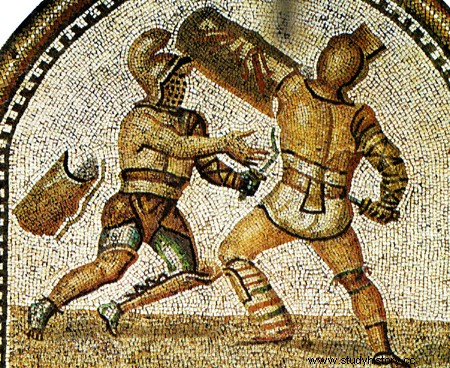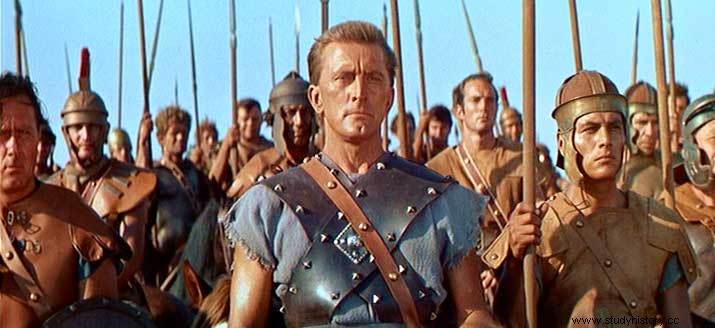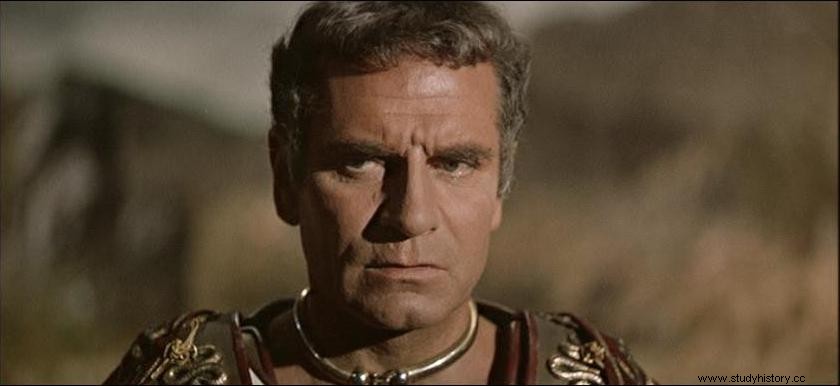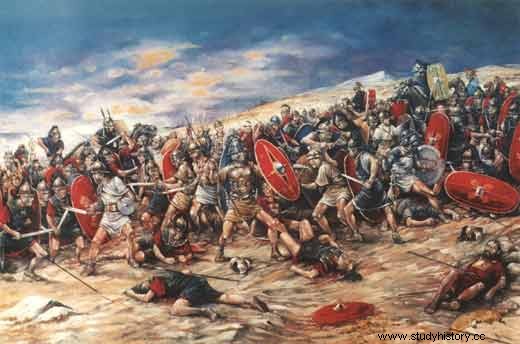Our archenemy today was neither a Germanic tribal warlord nor a Hellenistic wren, but a simple barbarian – an auxiliary turned slave – whose fearless fight for freedom surpassed his time and served as an inspiration for hundreds of generations to become an icon of modernity. fight against oppression.
Twenty-third installment of “Archienemies of Rome “. Collaboration of Gabriel Castelló.
Spartacus (Σπάρτακος in Greek) was born about 113 B.C. in the lands of the maedi , an ethnic group from ancient Thrace (probably in the vicinity of the town of Sandanski , in southwestern Bulgaria) Plutarch, Florus and Appian they are scant on details about his person before his forced entry into G's gladiatorial school. Cornelius Lentulus Batiatus (or Vatia) in Capua . All three sources agree that he was an auxiliary to the legions, that he deserted from the Roman army and that, when he was arrested, he was sold and ended up in a gypsum mine until the famous lanista bought him for his gladiatorial business. Only Plutarch adds that his wife, a kind of priestess of the maedi , was also arrested along with him; nothing else was heard of her. Despite the animosity he provoked for many years, the three historians considered him a cultured and fair man in his judgments and opinions. His name was common in the coastal lands of Pontus Euxine (the Black Sea) and some Thracian and Cimmerian kings and chieftains are known to have been called Spardakoros or Spardacus .

Gladiators
Thrace was a quasi-autonomous region, we could say a client kingdom, when Spartacus he enlisted as an auxiliary, since only the coastal strip maintained a permanent Roman occupation. He was surely not the only one to enlist, since from the Third Macedonian War to the Civil War between Pompey and Caesar (49-45 BC) Thrace permanently supplied auxiliaries to the legions. This detail should take away from our minds a nomadic shepherd or enslaved peasant Spartacus, because rather he would be a dissident combat professional of the Eagles of Rome. The Thracian king Rhascuporis is known to have he sent troops to Pompey in 48 BC, (when he was encamped in Dyrrachium , today Durazzo, Albania), so it would not be unreasonable to conjecture that in 74 or 75 B.C. Spartacus would have entered one of the levies destined to reinforce the government legions immersed in the conflicts of the Republic in Pontus, Asia or Hispania.
Spartacus he entered history when in 73 B.C. he headed alongside the Gauls Crixus and Oenomaus a riot in the school of gladiators of the famous lanista Lentulo Batiato. Of the 200 gladiators trained there, about 70 men managed to escape from that ludus , seize a wagon of weapons and combat material and break up a small force sent from neighboring Capua to catch them. Finding themselves free and with more gear and equipment to equip themselves with, the small army of slaves plundered the surrounding countryside, later taking refuge in the dense forest that at that time surrounded the slopes of Vesuvius.

Rome's response triggered the Third Servile War (73-71 BC) The situation was very embarrassing. Two long wars were being fought at both ends of the Republic, one led by L. Licinius Lucullus against Mithridates of Pontus in the East, while G. Pompey tried to avert the revolt of Quintus Sertorius in Hispania. This was one of the two factors that added up to guarantee a disaster:there were no legions in Italy and the matter of the slaves was not at all honorary or meritorious, rather a dirty job; therefore, the praetor G. Claudius Glabro he came out at the head of the urban cohorts willing to resolve this matter without disheveled, underestimating the capabilities of the rebels. His ineptitude led him to camp without fortifying himself in front of the lair of Spartacus and his men on Vesuvius, who, in a nocturnal action not lacking in audacity, precision and discipline, lowered themselves from their camp with ropes, surprised and massacred the unsuspecting Glabro's troops. The praetor managed to escape ignominiously, his reckless and reckless conduct being scorned in the Senate. The praetor P. Varinium , Glabro's substitute, reaped a similar result with greater troops, leaving as scalded as his predecessor.
The lack of veteran troops throughout Campania caused that during the winter of 73/72 B.C. Spartacus could strengthen his position, sack more towns, extend his shadow to the cities of Metaponto, Nuceria or Nola , free thousands of slaves and train them martially (something that certifies his knowledge of the military tactics of the time), coming to gather under his command, or perhaps sharing it with his comrade in arms Crixo, about 70,000 people . The Senate became seriously concerned as the slaves gained more troops, wealth and territory, as southern Italy was the breadbasket and estate park of the Roman aristocracy. Thus, the two consuls of 72 BC, L. Gellius Publicola and G. Cornelius Lentulus Clodianus In the spring, they mobilized two of the legions from the northern frontier to stamp out the troublesome servile revolt. From this moment on there are contradictions in the writings of Appian and Plutarch , so the facts could well have been different from the ones summarized here:The campaign was bittersweet for the rebels, while Spartacus' main force managed to defeat Clodianus in the Apennines , the praetor of Publicola, Arius , faced and defeated the powerful army commanded by Crixus in Apulia , battle in which the gladiator was killed along with two thirds of his men. The Thracian later managed to defeat both consuls at Piceno , and reaped a new victory against G. Cassius Longinus , governor of Cisalpine Gaul, in Mutina (Modena), but once again it was an almost Pyrrhic victory that only made his people inflamed, emboldened them more and turned their ambitions towards a hypothetical looting of Rome, the most desired destination for all of them.
As a former soldier, Spartacus well knew that it was only a matter of time before the legions defeated them, so he had to seek an urgent exit from Roman territory for his men. According to Salustio Crixus did not think like him; He was an impulsive man who let himself be carried away by his more quarrelsome Gauls and Germans, he even seriously considered taking Rome and plundering Italy until no town and village were left unscathed, and perhaps that divergence of views separated them and conditioned their destinies.
The Senate, horrified to see Spartacus so close to Rome with no force able to hold him back, commissioned him in 71 B.C. to Marcus Licinius Crassus , the richest, most insatiable and arrogant man in Rome, to take charge of the operations and liquidate the problem definitively. He was given command over eight legions and was not shy about applying harsh discipline to frightened and demoralized troops, even decimating a cohort accused of cowardice. Such a harsh measure ensured that no one else fled, abandoning weapons and equipment at the mercy of the enemy, as had happened just before taking command.

Laurence Olivier as Marcus Licinius Crassus
As Hannibal decided at the time, Spartacus convinced his followers of the impossibility of taking the walls of Rome by assault, they erected tents and returned to Campania . It was around this time that the Thracian probably came into contact with the Cilician pirates, with whom he agreed to send a fleet to take them out of Italy from Rhegium (Reggio di Calabria) The pirates betrayed Spartacus, perhaps bribed by Verres , the controversial governor of Sicily. Crassus pursued the rebels until they were cornered near Rhegium and confined to the Calabrian peninsula by building a 65 km wall. Spartacus, knowing that Crassus would soon receive reinforcements, tried to agree with him on a negotiated solution to the conflict without any success. Seeing his refusal, he managed to circumvent Crassus's encirclement using a trick learned from the one-eyed Carthaginian, launching a night stampede of cattle against a section of the wall while he and his men passed him at the opposite end. The cattle, carrying torches on their necks, distracted Crassus's troops long enough for Spartacus to reach Lucania .
Spartacus's extraordinary escape strained the patience of the Senate as well as reddened Crassus's face. Lucullus was ordered to land his legions from Asia at Brundisium (Bríndisi) while Pompey did the same with his from Hispania in the Bruttio . The sum of the three armies represented a total of 20 legions (about 120,000 men) , many of them made up of hardened veterans of the wars against Mithridates and Sertorius. Cornered and harassed, a new dissension arose among the slaves, this time led by two of their leaders, Gaunico and Casto , which split a force of 30,000 men that was defeated by Crassus. This new mishap forced Spartacus to march towards the Adriatic, but when he was already close to Brundisium he was informed that Lucullus had just landed there, so he turned around in search of an impatient Crassus who was not willing to share with the newcomer. Pompey arrived the glory of triumph.

The final confrontation took place in the valley of the Río Sele (Silario), in the current territory of Senerchia near the town of Quaglietta, in the Alto Valle del Sele (Lucania region) In that valley the 80,000 slaves of Spartacus came face to face and the 40,000 legionnaires of Crassus . When both formations were ready, they took his horse to Spartacus, and Spartacus, determined to fight as one of the others, killed him with his sword, saying afterwards:"victory will give me enough horses from among the enemies, and if I am defeated , I won't need it anymore «. That time discipline and tactical superiority prevailed over the impetus and ardor of the rebels. About 60,000 men fell that morning on the banks of the Sele, including Spartacus himself. The 6,000 men Crassus captured were crucified on the Appian Way from Capua to Rome as a grim warning to any slave who thought he might again challenge the power of the Republic. Nearly 2,000 men managed to join the Cilician pirates, while the 5,000 survivors who managed to escape Crassus's gladia ran into Pompey's a few days later. Crassus, after all the efforts and disappointments, had to dispute with Picenus the honor of having eradicated the revolt, since Pompey was the first to arrive in the City and claim it for himself.
Spartacus It will always be a timeless source of inspiration for those who fight against oppression. Of all the works I know, I prefer the wonderful novel by Howard Fast that served as motivation to Kirk Douglas for Stanley Kubrick to shoot a masterpiece. About the Spartacus, Blood and Sand that we have seen on TV, any resemblance to reality is pure chance.
